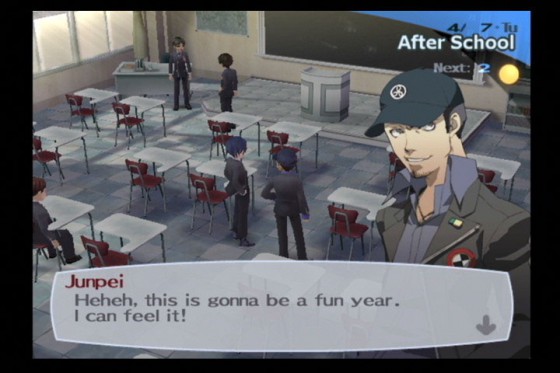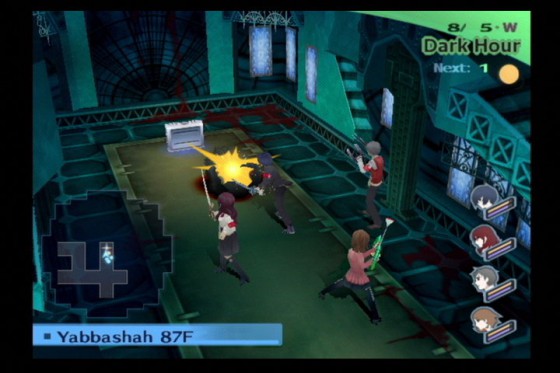During a phone conversation between session of playing Persona 3, somebody asked me how I was liking it. After a brief moment of thought, I summed up all the feelings I had for the game in one simple sentence: “It has changed the way I think about RPGs.”
If you don’t know much about Persona 3, that statement might not make a lot of sense. What’s so special about this game? Why does it deserve such a score? The reason Persona 3 has forced me to reconsider what I want from an RPG is because, more than almost any other title I can remember playing in recent or distant history, it gets it.
How many locations can you name from the last RPG you played? How many of the people that you met along the way can you remember? Who were they? What did they do, why did they exist? Hell, how much could you even tell me about the characters that were in your own party, the people who followed you around for the entire game?
That, my dear reader, is what Persona 3 understands. Unlike so many other RPGs that have come out throughout the years, here we are set down in the middle of an imaginary world, filled with people and places and events and experiences, and then we’re encouraged to not just play the game, but honestly care. The characters you’ll be introduced to aren’t simply tools used by the developer to convey information to the player, they’re people with lives and problems to meet, get to know, and hopefully befriend. The game’s locations–from Gekkoukan High to Paulownia Mall–aren’t brief stops that you’ll visit for five minutes and then never see again, but pieces of a larger city that you’ll come to know and love.
All this is created by the Social Link system, the means by which you advance relationships with the various characters in the game. Once you’ve initially been introduced to a specific character, a trackable Social Link will be created between the two of you, and each of those links represents a specific tarot arcana type. You then grow those links by interacting with the game’s characters via events, chance meetings, perhaps a telephone call from them asking you to go see a movie together on the weekend, or even dates with one (or more) of the girls you’ve befriended. As the connection between you and a specific character becomes stronger, so too does your relationship with that particular arcana. When it comes time to create through fusion new and more powerful types of Persona–the inner “selves” that each of our heroes has inside of them through which they battle the demons that now plague the world–the initial XP those new Persona gain will increase significantly the higher your social link of the same arcana is. Thus, the more you connect with the world and get to know its inhabitants, the stronger you’ll be when it comes time once again to fight to save the world.
Because of the relationship between the Social Links and the combat side of Persona 3, it’s easy initially to be tricked into thinking that all of this is little more than a clever gimmick to add a fresh new coat of paint to the routine experience of character leveling. What you then come to learn is that, more importantly, the Social Link system is the key through which you’ll unlock the world that Persona 3 has to offer, one small yet engrossing piece at a time. As the game goes on, your interaction with characters still increases your arcana strength, but it becomes almost a nice side bonus; the true importance, at that point, is learning more about the lives in which you’ve now become involved.
While the Social Links aspect of the game is the major component of Persona 3‘s social side, there’s so much more to be found beyond it. It’s amazing how utterly enjoyable Atlus has made the mundane life of a typical Japanese high school student. Paying attention in class, taking tests, going to after-school clubs, getting good grades, findind a good balance between studying and having fun, could all of these things really be put into an RPG and result in a fun experience? After playing Persona 3, the answer is yes. Absolutely, positively yes. In fact, next time around, I’d even like to see Atlus go crazy and make the game a full-on school/social sim for the non-combat hours of each virtual day.
Fear not, those of you who may be thinking the Persona of old has been destroyed and replaced with some wacky touchy-feely dating game: Persona 3 hasn’t forgotten its roots. There are still ample amounts of knock-down, drag-out warfare with the evil Shadows and their masters, and surviving those battles will still come from a healthy dose of character leveling and a whole mess of the before-mentioned Persona creation. Perhaps in an attempt to make the game a wee bit friendlier to the more casual non-Megaten folks out there, how much (or how little) time you spend ascending the randomly-generated floors of Tartarus is left up to you for most of the game. Want to go hardcore in your role as a demon slayer? Have fun. Want to spend more time enjoying the less dangerous aspects of the game, and only focus on the required storyline-centered boss fights? Go right ahead.
There has been a bit of controversy in one of the decisions that was made concerning Persona 3: your teammates in battle are A.I. controlled, and while you can give them suggestions as to what kind of strategy you’d like them to use, you’ll never have complete or direct control over them. Some may call me a heretic, but I have always (and always will) preferred having my teammates A.I. controlled. What is an RPG, if not a means through which we can enter a fantasy world and live out the life of another who is involved in this amazing story? Having the other members of S.E.E.S. be controlled not by you, but by the computer, makes them feel more like individuals who are making their own decisions, and this–the strengthening of the idea that each character is not just some sprite in a video game, but a real character in a real world–is exactly what is at the core of Persona 3. I know, some of you will still argue that this is a case of style over substance, but let me assure you that your A.I. teammates are a smart bunch who will work very hard to support you in your many battles. Well, okay, mostly… there were a few times I wanted to kick that stupid Yukari in the head for acting like a moron. Honestly, though, my desires for bringing violence down upon my squad were really few and far between.
With these two such different halves of Persona 3—the side which cares about characters and storytelling and just living life, and the side that is about saving the world and dungeon crawling and becoming a better and more skilled ass-kicking machine—it would have been so easy for the game to have ended up a complete mess, like two separate projects had been duct-taped together and called a final product. Instead, Atlus deserves all the credit in the world for how well they were able to pack two seemingly incompatible game genres together into one so cleverly designed package. A package, by the way, that is then wrapped in an audio and visual style as unique as the gameplay itself, decorated lovingly with an utterly fantastic soundtrack, great English voice acting, and animated cut-scenes so good that it is downright criminal that Atlus has not expanded them into a full anime series. (No, really, Atlus… Persona 3 was a smash hit in Japan, so where’s the anime TV series?!)
If Persona 3 has one major flaw, it is the point at which the harsh realization sets in that this game is too ambitious for its own good. Mediocre games are tolerated, good games are enjoyed, but great games make us almost fearful to keep playing, because the more we do, the closer we get to their end. Every moment I spent interacting with the game’s characters was cherished, but one after another, the extent of those experiences was reached. I wooed sweet Yuko, got to know her, her hopes, dreams, and ambitions, and even shared a tender moment or two with her. And then, our Social Link was maxed out, and her desire to walk home with me after school like we had done so many times before was no more. There was still so much I wanted to do together! So many things I wanted to show you Yuko, so many places I wanted to take you, so many aspects of life for us to discover together! How could you be so cruel to me, after I gave you and only you my heart?!
*sigh*
As heartbroken as I may be, I can’t blame Persona 3 for not being more than it set out to be, because it took a lot of chances and really pulled off everything it attempted. Instead, I blame the game for now making me want a Persona 4 that would probably be financially (and logistically) impossible for Atlus to produce.
Games like Persona 3 are the reason we play games. So, I can’t say this enough: play it.
Rating: A
[simpleviewer gallery_id=”17″]


